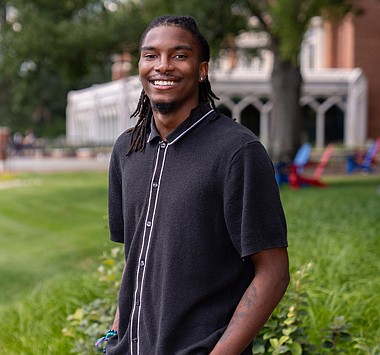Personality: Devin Morgan
Spotlight on the University of Richmond’s 2025-26 Newman Civic Fellow
10/30/2025, 6 p.m.
University of Richmond senior Devin Morgan’s leadership in environmental justice and food equity has earned him the prestigious Newman Civic Fellowship for 2025-26. His impactful work with the Sierra Club and Shalom Farms, along with his on-campus initiatives, has demonstrated a deep commitment to social change, a key requirement for the fellowship that supports community-committed college students.
“I got an email during the summer,” Morgan said. “I feel honored because sometimes people don’t see the work you’re doing.”
Newman Civic Fellows receive stipends, scholarships and grants to support academic pursuits and social impact projects. The national recognition serves to nurture and amplify the capabilities of its fellows and the positive impacts of the work in their communities. During the one-year program, fellows also receive resources for applying to graduate school and for networking to support their civic pursuits.
“The networking with a cohort of civic-minded students on other campuses is inspiring,” Morgan said.
Morgan’s academic excellence and community engagement are underscored by his roles as a Presidential Scholar and Bonner Scholar. Last semester, Morgan spent three months in Morocco, Nepal and Ecuador through the International Honors Program, an initiative of the School for International Training that provided him with a global perspective on social issues.
As a political science major with a minor in environmental science, Morgan is driven to advocate for marginalized communities. Inspired by one of his heroes, Huey P. Newton, and the Black Panther Party’s efforts to feed underserved children, he wants to make a difference through his career pursuits. His goal is to work in environmental law, sustainability and climate change.
Morgan, a Houston native, was raised by his mother after his father died of a heart attack when he was 3. He watched his mother work as a waitress to support him and his two younger brothers while dealing with the trauma of losing her significant other at such an early age. The experience instilled a commitment to succeed academically and work toward food and environmental justice.
“My family is why I do what I do. I had to be my own role model,” he said. “Now, I’m the role model for my brothers.”
Morgan’s leadership in sustainability, environmental science and food justice marks him as an emerging leader ready to make a meaningful impact on marginalized communities. His work goes beyond personal achievement, aiming to improve the lives of those who need it most.
Where do you live?
On campus.
Tell us about your family.
My mother and two younger brothers, who are 19 and 15.
What is the Newman Civic Fellowship?
It’s a one-year civic fellowship program for students who do civic work on their campuses. We get grants, resources for applying to grad school, and network with a cohort of like-minded people.
What was the nomination process?
The Center for Civic Engagement gave my name to the president, who nominated me. Other schools make students apply, but I didn’t have to.
What are some of the local organizations you’ve worked with?
I had internships at the Sierra Club Virginia Chapter, a grassroots environmental nonprofit, and at Shalom Farms, a farm and food justice organization. I served on the Young Leaders Council of the Sierra Club, a leadership and advocacy group that amplifies our voices on issues in our state.
Why did you choose to work with Shalom Farms?
I did a high school capstone project on food deserts. The model for my capstone was literally what Shalom Farms was doing, and I immediately gravitated to the organization.
What other activities are you involved with on campus?
I’m president of Green UR, a student-led environmental advocacy group on campus. We lead recycling and waste reduction drives and encourage sustainable and environmentally just choices on and off campus. We put the pressure on UR to divest from fossil fuels. We’ve also built a student movement to put pressure on the university not to sign the current U.S. administration’s Compact for Academic Excellence in Higher Education, and we’ve worked to let the university’s administration know how diversity benefits our campus because diversity is beautiful.
What was your study abroad experience like?
Last semester, I was able to experience the Sahara Desert, the Himalayas and the Amazon rainforest in a span of three months. It was culturally immersive and spiritually fulfilling to experience how different life is outside the U.S. The food and the people were amazing. I lived with a family in each country for a month and, during my time in Morocco, it was Ramadan, so I fasted with my host family. It was also my first time in Africa.
How do you start the day?
I’m not really a morning person. I wake up, have breakfast and prepare for my classes.
Who is your dream dinner party guest?
My great-great-great-grandfather, Charles G. Hurst Jr., who was the president of Malcolm X College in Chicago.
What is a quote that inspires you?
“Treat every community that you go into like home and the people in it like family.”
Who has influenced you the most in your life?
My mom.
What is a book that has influenced you?
“Passport to Freedom: Education, Humanism, & Malcolm X,” by my great-great-great-grandfather, Charles G. Hurst Jr.
What are you currently reading?
I don’t have much time to read for pleasure at the moment. I’m too busy reading for class.
What are your plans after graduation?
I want to continue my education, perhaps by pursuing a Juris Doctor or a master’s degree in public policy or public administration.







